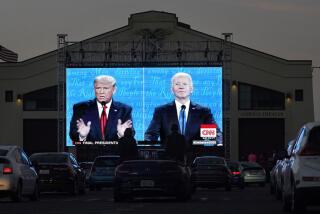Zedillo Attempts Damage Control as Mexico’s Top Drug Fighter Is Jailed
The army general who served as Mexico’s anti-narcotics czar was jailed Wednesday on drug corruption charges, even as President Ernesto Zedillo launched a damage-control effort in the shellshocked armed forces, seeking to boost their image and preserve their expanding role in the U.S.-Mexican war on the multibillion-dollar narcotics trade.
Zedillo, using an Army Day celebration as the stage, told thousands of officers and soldiers that the arrest of Gen. Jose de Jesus Gutierrez Rebollo, the ousted chief of Mexico’s equivalent of the U.S. Drug Enforcement Administration, was meant not to damage but to strengthen “the honor and integrity of the armed forces through the strict observance of the law.”
“Making a pretense and burying the truth cannot strengthen any institution,” Zedillo, the commander in chief, told the group, without naming Gutierrez.
But at the same ceremony, a grim-faced Gen. Enrique Cervantes Aguirre, Mexico’s defense secretary, conceded: “Neither the greatest toughness nor the strictest severity will be able to repair the damage that a bad, high-ranking soldier inflicts on Mexico when he betrays all his values.”
There were other ironies--and unanswered questions--Wednesday in the aftermath of one of the worst military scandals to erupt in public here in recent history.
After Gutierrez was locked up in a maximum-security prison on Mexico City’s outskirts early Wednesday, Atty. Gen. Jorge Madrazo Cuellar said the 62-year-old career military officer was among the first to be charged with violating Mexico’s new organized-crime law--tough legislation that the army and federal prosecutors pushed through the National Congress last year, with U.S. encouragement, to better target the country’s powerful drug mafias.
Specifically, Madrazo said, Gutierrez was formally accused of taking bribes and fostering cocaine trafficking for the country’s biggest drug-smuggling cartel, allegedly headed by Amado Carrillo Fuentes. U.S. officials say Carrillo plays a lead role in supplying up to three-fourths of the cocaine sold in the United States.
Madrazo, a former human rights lawyer who has signed off on dozens of military appointments to key federal law enforcement posts since taking office 11 weeks ago, spoke after he was barraged by reporters.
In the questions they posed to him, the reporters echoed the frustration of many Mexicans after the arrest of a military counter-narcotics official who had been believed to be incorruptible both here and in Washington.
“Sir, are the narcos winning the battle against the [country’s] institutions?” one reporter shouted.
“No. No. We’re going to beat the narcos,” Madrazo replied. “We are going to emerge victorious in this battle.”
“Will you continue proposing military officers in positions of this nature?” another reporter asked.
“This we have to study with great care,” Madrazo said.
As an interim move Tuesday, Madrazo appointed another army general, Tito Valencia Ortiz, to replace Gutierrez as head of the National Institute to Combat Drugs.
Neither Madrazo nor the army, though, explained just how Gutierrez, who is now charged with collaborating with Carrillo’s Juarez drug cartel as long ago as 1993, could have been named to so senior a post without an internal investigation.
Cervantes, the defense secretary, said he recommended Gutierrez to Zedillo in December because of the general’s record during his seven years as division commander in Guadalajara: Key drug arrests that included the capture of an accused leader of another cartel. It was only after Gutierrez moved to Mexico City--into a luxury apartment that investigators later linked to Carrillo--that Cervantes said he confronted Gutierrez, “who became worried and upset and gave confusing answers.”
In a nation where civilian intelligence services routinely tap telephones and use tough tactics to investigate the backgrounds of even mid-level officials, some analysts said Gutierrez’s case helped illustrate the wide gulf between Mexico’s long-insulated army and its civilian institutions.
“It’s a tremendous intelligence lapse, and it shows the difficulty in penetrating the background of military personnel,” Roderic Camp, a Tulane University professor who has studied the Mexican army, said of Gutierrez’s appointment.
More to Read
Start your day right
Sign up for Essential California for news, features and recommendations from the L.A. Times and beyond in your inbox six days a week.
You may occasionally receive promotional content from the Los Angeles Times.






